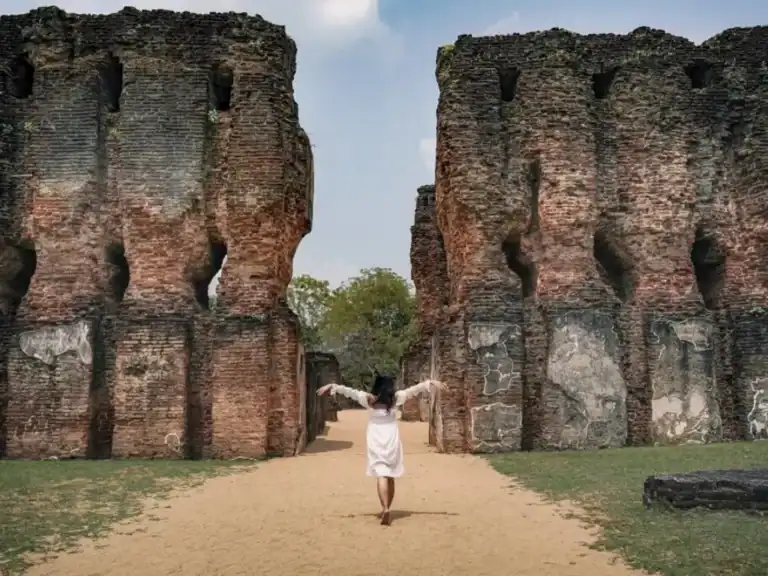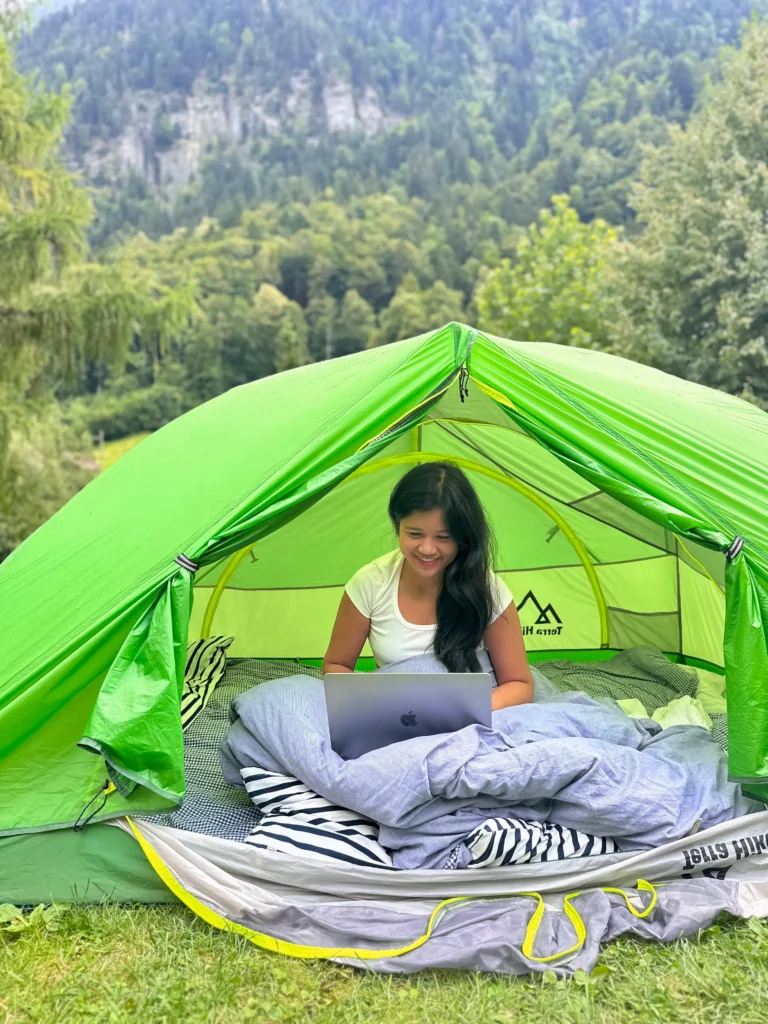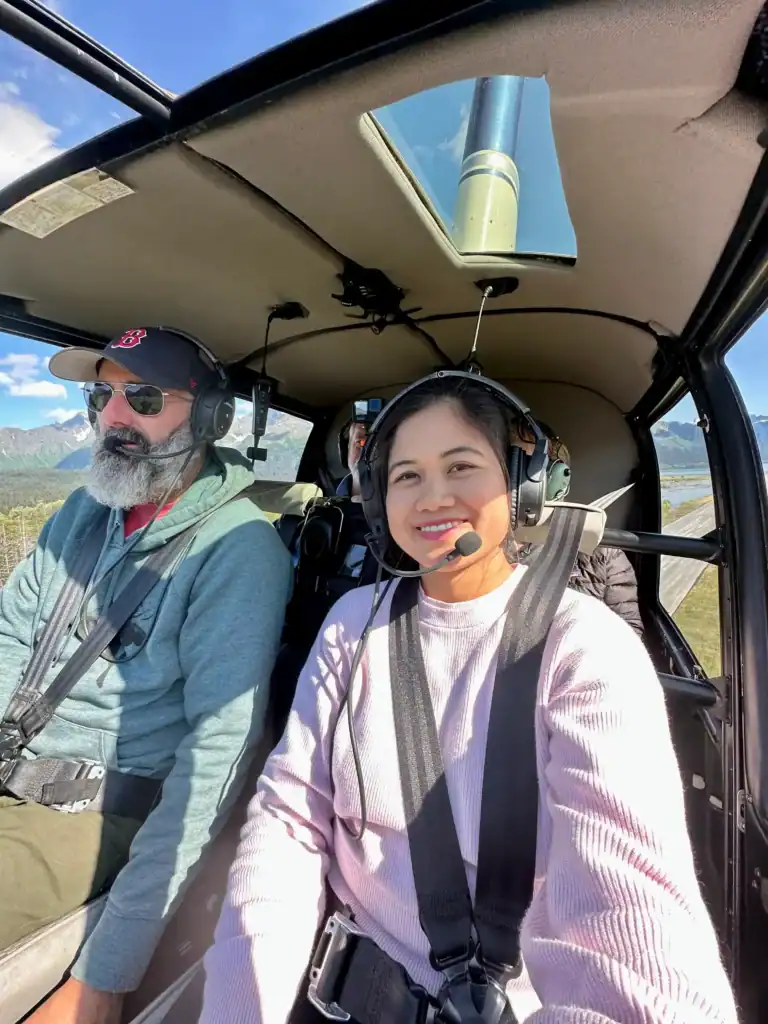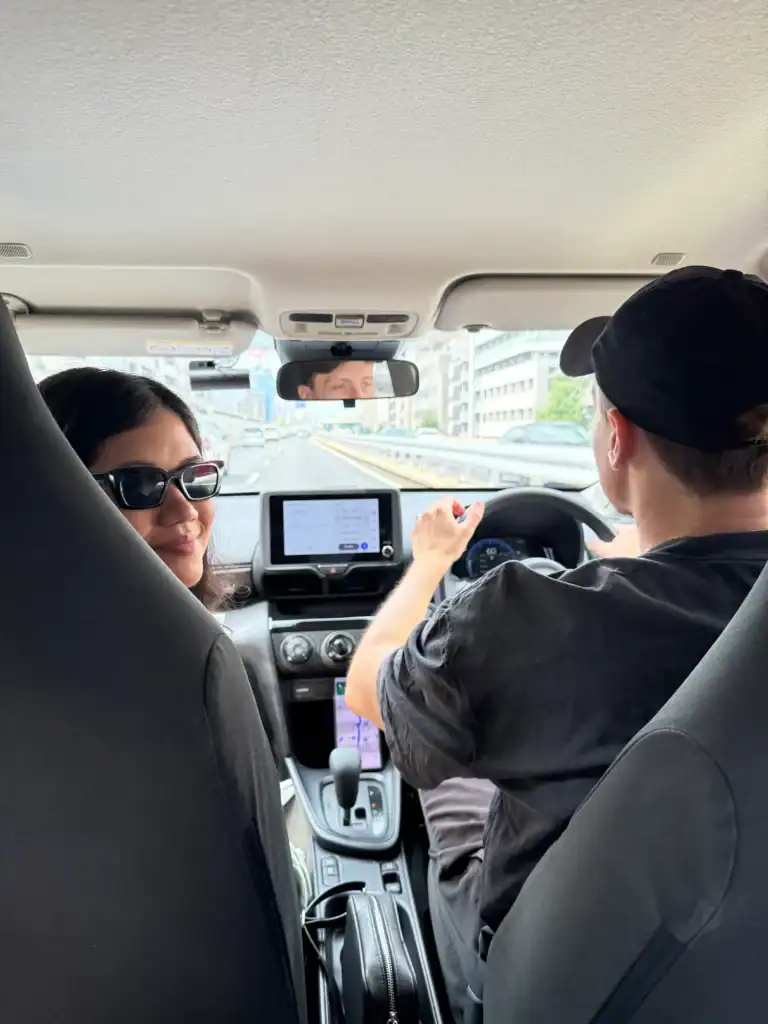Is Worldpackers Safe? Read This Before You Volunteer
When people ask me how I can travel the world non-stop, I tell them: I volunteer.
In exchange for a few hours of work each day, I get free accommodation, sometimes meals, and often free tours. Their eyes widen.
“Wait… so you just live with strangers?”
“Isn’t that dangerous?”
“What if something goes wrong?”
I get it. It sounds both too good to be true and scary. Imagine flying solo to a country you’ve never been to, then living and working with strangers you met online. No concierge. No refunds. No safety net.
And yet, volunteering—especially through Worldpackers—has given me some of the most perspective-shifting, heart-expanding experiences of my life.
Before I ever signed up, I was the one doom-scrolling Reddit, looking for red flags and reassurance that I wasn’t about to make a huge mistake.
After volunteering across the U.S., Jordan, Turkey, and Greece, I’ve learned what’s legit, what’s risky, and how to stay safe while still embracing the adventure.
If you’re asking yourself, “Is Worldpackers really safe?”—this guide is for you.
I’ll walk you through what it’s like to volunteer, the risks you should consider, the red flags I’ve learned to spot, and how to confidently prepare for your first volunteer gig.

Disclosure: This page contains affiliate links at no extra cost to you. Learn more.
1. Is Worldpackers Safe? My Honest Experience
In short: yes, Worldpackers is safe—but it’s not foolproof.
Over the past year, I’ve volunteered through the platform in a variety of settings: from hostels in the U.S. to a homestay in Turkey and even a Bedouin camp in Jordan.
Most of the time, it was just me—traveling solo, figuring things out one bus ride and one Google Translate attempt at a time. Occasionally, my partner joined me, and we volunteered together at two wonderful hosts in the U.S.
For the most part, the experiences were safe, welcoming, and genuinely enriching. But not all hosts are the same.
At one hostel, I encountered a manager who was oddly controlling—volunteers weren’t allowed to use certain spaces freely, our communal food kept going missing, and the overall atmosphere felt tense. One volunteer even left early because it got too uncomfortable.
I stayed, but I made a point to get out of the hostel as much as I could after my shifts. I wanted to honor my commitment, but I also needed to protect my peace.
That experience didn’t make me give up on volunteering—but it taught me to be more cautious. And that’s the heart of it: Worldpackers is safe when you know what to look for.
The platform does offer built-in safety tools like 24/7 support, a Worldpackers Refund, and Worldpackers Insurance (which steps in if your host cancels last minute or things don’t go as agreed). These features give you a safety net—but ideally, you won’t have to use them if you do your part by reading reviews, asking questions, and listening to your gut.
These lessons don’t just apply to Worldpackers. Whether you’re using Workaway or another volunteer platform, it’s still up to you to do your research, ask questions, and make sure the experience aligns with your boundaries and values.
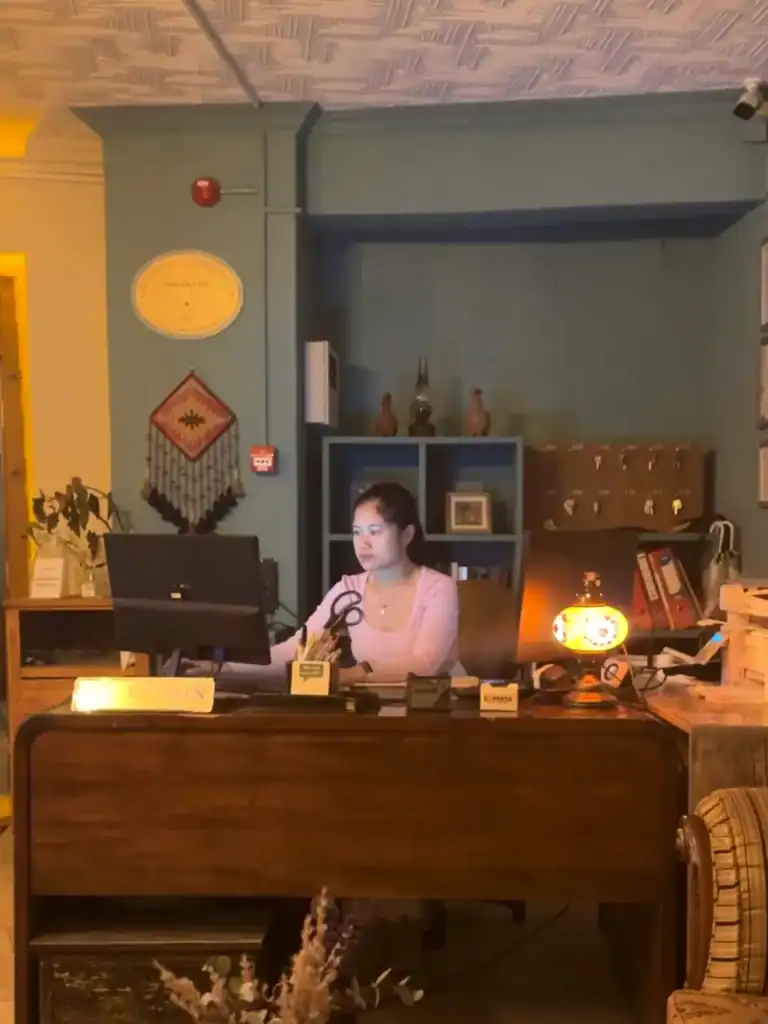
2. Not All Hosts Are the Same—Here’s How to Choose the Right One
Not all volunteer hosts are created equal. Some will feel like family from day one. Others… not so much.
One time, while searching for a project in Jordan, I came across a listing that sounded vague—just a few lines about needing help with “social media.” I messaged the host for more info. He asked me to move the conversation to WhatsApp, and within minutes said, “Okay, you can come,” without asking anything about my experience or skills.
It felt off—too fast, too unstructured. Like there was no real screening process at all. So I didn’t go.
🤩 Pro Tip: It’s okay to chat on WhatsApp or even do a video call, but always make sure to finalize your trip through the Worldpackers platform. Ask your host to hit “confirm” and include your agreed-upon dates, tasks, or any important details not specified in their listing. That way, if something goes wrong, you’ll be officially covered by Worldpackers Insurance.
Over time, I’ve learned to spot red flags early—before I even hit the “apply” button. Here’s what I always look out for:
🚩 Red Flags in a Host Listing:
- Vague or copy-pasted descriptions
- No clear mention of work hours, tasks, or time off
- More work than what feels fair (e.g., 6+ hours/day for basic accommodation with no meals)
- No photos of the host or the place
- No recent reviews (or only overly generic ones)
- Bad Reviews and no clarification from the host
- Host pushes to move the conversation off-platform early
- Reviews that hint at boundary issues or poor communication
- A feeling of “too good to be true” — trust that

✅ Vetting Hosts Through Questions
After staying with multiple hosts—and getting into two situations I wish I hadn’t—I now always ask key questions before confirming. These give me a clearer picture of what I’m saying yes to.
Some of my essentials include:
- What are the daily tasks?
- Will I have a day off?
- Is there a shared kitchen?
- Where will I sleep?
- Is food provided, and how many meals per day?
- Is there public transportation nearby?
These might seem basic, but they matter so much. And the way a host responds (warmly, clearly, vaguely, defensively) tells you even more than their actual answers. I’ve put together a full checklist of what to ask your host in Section #5—so you can avoid weird surprises and set the right expectations from day one.
💬 Can You Message Past Volunteers? Yes—and You Should.
One feature I really appreciate about Worldpackers is that you can message people who’ve volunteered with that host before. That kind of access can be a game-changer and you should maximize it.
I once had a volunteer reach out to me asking about my experience at a hostel in the US. The host had over 30 positive reviews, but the volunteer wanted clarification on one detail. She messaged me directly through the platform, and I was happy to answer honestly.
Bottom line? Do your research. Ask the right questions. And never ignore your gut. Choosing the right host makes all the difference between a transformational experience and a frustrating one — where you wished you just paid your accommodation.
3. What Worldpackers Offers to Keep You Safe
While no platform can guarantee a perfect experience, Worldpackers does have some of the strongest safety nets out there—especially if something goes wrong.
In fact, it’s the only major volunteering platform that offers this kind of built-in “insurance.” Other platforms, like Workaway or WOOF, simply recommend that you get your own personal travel insurance. With Worldpackers, you actually get protection for your volunteering experience itself—but only if your trip is officially confirmed through the platform.
🛡️ WP Safeguard (In Case Something Goes Wrong)
If your host cancels last-minute or your experience turns out to be completely different from what was agreed upon, Worldpackers will either help relocate you to a new host or reimburse you for emergency accommodation—up to $59, and even more depending on your plan.
Important Notes about WP Safeguard:
Depending on your membership:
- Solo Trips Plan: up to 3 nights / $59 USD
- WP Pack: up to 7 nights / $199 USD
- WP Pack Plus: up to 14 nights / $399 USD

I haven’t needed to use it myself, but a fellow volunteer I met in the U.S. did—after leaving a stressful situation with a controlling hostel manager. She was reimbursed for a few nights in a hotel while she made new plans. Knowing that backup existed made a huge difference for both of us.
🤩 Get $10 off on ANY Worldpackers membership when you use the code GLADIS — plus extra 3 months if you sign up by May 31!
🔁 Host Response Guarantee
Worried that you will not get a host? If you apply to five or more hosts within 30 days of buying your plan and none of them reply—you can request a full refund of your membership fee.
But there’s a catch: your applications need to be thoughtful and specific.
If you send a generic message like “Hello” or “I want to volunteer,” it doesn’t count. You need to write distinct, personal messages to each host. Mention what you can offer, why you’re a good fit, and show that you actually read their listing. This is what usually gets you accepted in the first place.
This policy encourages both hosts and volunteers to take the exchange seriously.
📞 How Fast Does Worldpackers Support Respond?
Worldpackers offers 24/7 support, though response times can vary.
I haven’t personally had to reach out (yet), but I’ve talked to volunteers who have. Based on their experience:
- You’ll usually receive a reply within two business days via email.
- Responses can take up to 4 days if it’s a weekend or a national holiday in Brazil (where the WP team is based).
- Support is faster through the ticket system than by email.
What Worldpackers Doesn’t Cover
This is important: Worldpackers Insurance is not travel or health insurance. It won’t cover hospital bills, flight delays, or lost luggage. It’s purely there to protect your volunteering experience—not your entire trip.
For everything else, I use SafetyWing, which covers medical emergencies, trip interruptions, and even remote work setups. I wrote a full breakdown of my experience with them here: Read My Honest SafetyWing Review
These tools—WP Safeguard, Host Response Guarantee, and real human support—offer peace of mind. But they only work if you do your part: confirm your trip through the platform, know what’s covered, and back it up with your own travel insurance. That’s how you volunteer smart and safe.
Worldpackers has your back—but you have to take the first step to protect yourself, too.
✈️ One thing that helps me feel safe while volunteering? Travel insurance. I use SafetyWing because it’s designed for travelers like us—people exploring new countries where we don’t always know how the healthcare system works.
And for short trips, I often book through Klook—it’s convenient, affordable, and easy to use on the go.
4. Is Volunteering Safe for Solo Travelers
The short answer: yes, it can be safe—but like anything, it depends on where you’re going, who you’re staying with, and how well you prepare. I’ve been traveling solo for over 10 years now, and I’m still alive—but that’s not just luck. It’s because I learned to stay alert, ask the right questions, and trust my gut.
I’ve volunteered solo in Asia, Europe and America. And yes, I’ve had moments of fear and doubt. But I’ve also had moments of connection, warmth, and awe that I never would’ve experienced if I’d stayed in my comfort zone.
I’ll never forget the moment I first arrived in Wadi Rum, Jordan.
It was my first time in a conservative Muslim country, and I’ll admit—it felt like I had stepped into a scene from one of those dramatic “desert survival” movies. Everyone around me was wearing traditional clothing: the men in long robes and red-checkered headscarves, and the women fully covered from head to toe.
I arrived by bus and was told someone would pick me up on behalf of the host. I climbed into a 4×4 jeep with a stranger I had never seen in my life, driving straight into the desert. We passed wide-open sands and a rode that seemed endless until we arrived in a tiny village surrounded by nothing but silence and desert.
As I stepped out of the jeep, people stared. My host’s aunt met me outside and led me into their home. She handed me a tray with tea, tuna, fresh tomatoes, cucumbers, and warm bread—then quietly left me alone in the living room. That was it. No explanation, no welcome tour—just me, a stranger in a quiet house, hoping I hadn’t made a mistake.
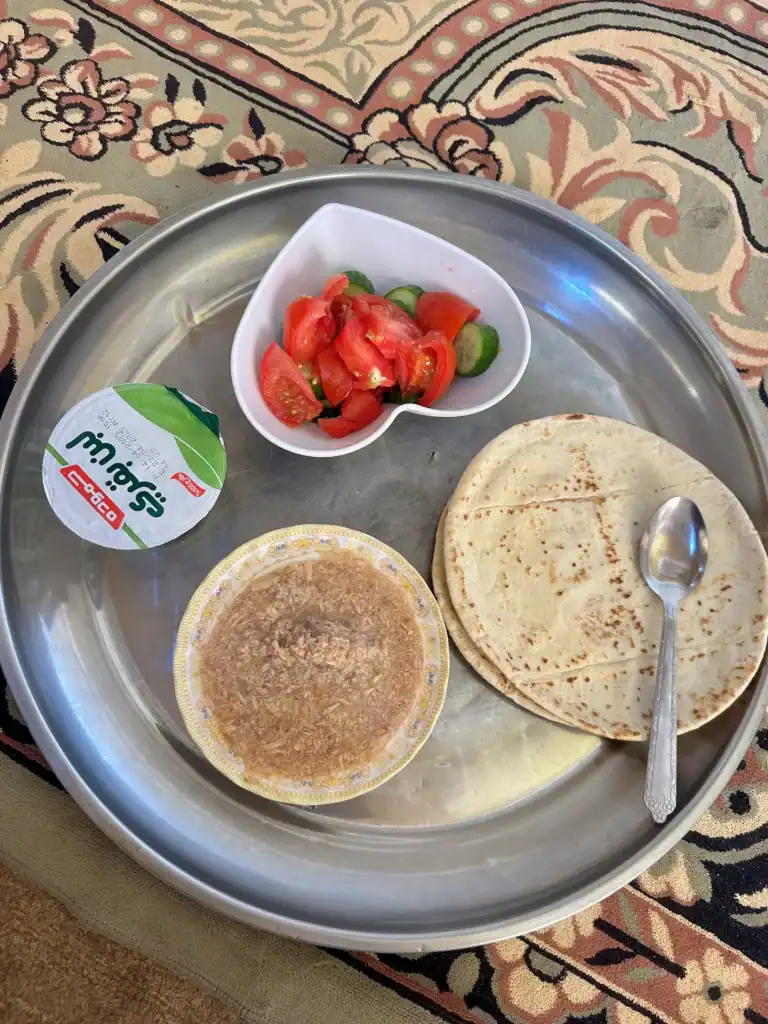
In my head, I kept thinking, “I hope I don’t get kidnapped.”
But I didn’t.
In just a few hours, I was sitting with the family, laughing, learning a few Arabic words, and sharing a dinner. That night, I felt safe. Seen. And strangely at home.
💡 Tips for Staying Safe as a Solo Volunteer
Over time, I’ve created my own personal checklist for arriving in a new country alone—especially when volunteering. Here’s what I recommend:
✅ Before You Arrive
- Always arrive during the day, when it’s easier (and safer) to navigate.
- Confirm how you’ll get to your host ahead of time: Will they pick you up? Should you take a taxi or a local bus?
- Have the exact address written down—don’t rely on memory or screenshots.
- Remind your host the day before you arrive. Many hosts are busy or juggling multiple volunteers, so it helps to send a quick message, especially if your flight is delayed.
- Carry some cash and know where the nearest ATM is. Airport ATMs usually have terrible rates—if you have a Wise card, withdraw with it.
- Set up an eSIM in advance. I use Airalo—Not all airports have free Wi-Fi.
- Have a power bank with you, just in case your phone dies mid-transit. You don’t want it to happen.
💡 Stay connected—and stay safe—during your volunteering!
After traveling to 35+ countries, I now prefer using Airalo’s eSIM for its easy setup, fair pricing, and instant top-ups—no need to find a local SIM or risk going offline when you need help most. Get US$3 off on your first purchase with discount code: GLADIS1238 or get 10% off for your top-ups and new e-SIMs using this link.
📱 Tools I Use to Stay Safe
- Offline Google Maps — download the region or city before you land.
- Photocopy your passport and store a photo of it on your phone.
- Airalo eSIM — keeps me connected the moment I land, even before I find Wi-Fi.
- Translation apps, especially in non-English-speaking countries.
- Emergency contacts listed in your phone under ICE (In Case of Emergency).
For all the tools and resources I use during my travels and volunteering, check out my favorite travel tools.
How to Trust Your Gut (and When to Listen to It)
Solo travel will sharpen your intuition more than anything else. But here’s the thing—it’s not always about danger. Sometimes, it’s just unfamiliarity.
If you feel uneasy, ask yourself: Is this unsafe, or is it just new?
Read up on the local culture. What might feel strange to you could be completely normal there.
But if it is about your environment—especially your host or their behavior—listen to that voice. Stay in public spaces, don’t be afraid to ask for help, and let someone you trust know what’s going on.
I’ve never had a host cross the line, but I’ve read reviews from volunteers who weren’t so lucky. If that happens, you’re allowed to leave. You don’t owe anyone your safety or comfort. Talk to Worldpackers support, reach out to your network, and walk away if needed.
Volunteering solo is empowering. It teaches you to take care of yourself, speak up for your needs, and connect with people in deeply human ways.
You don’t have to be fearless—you just have to be prepared.
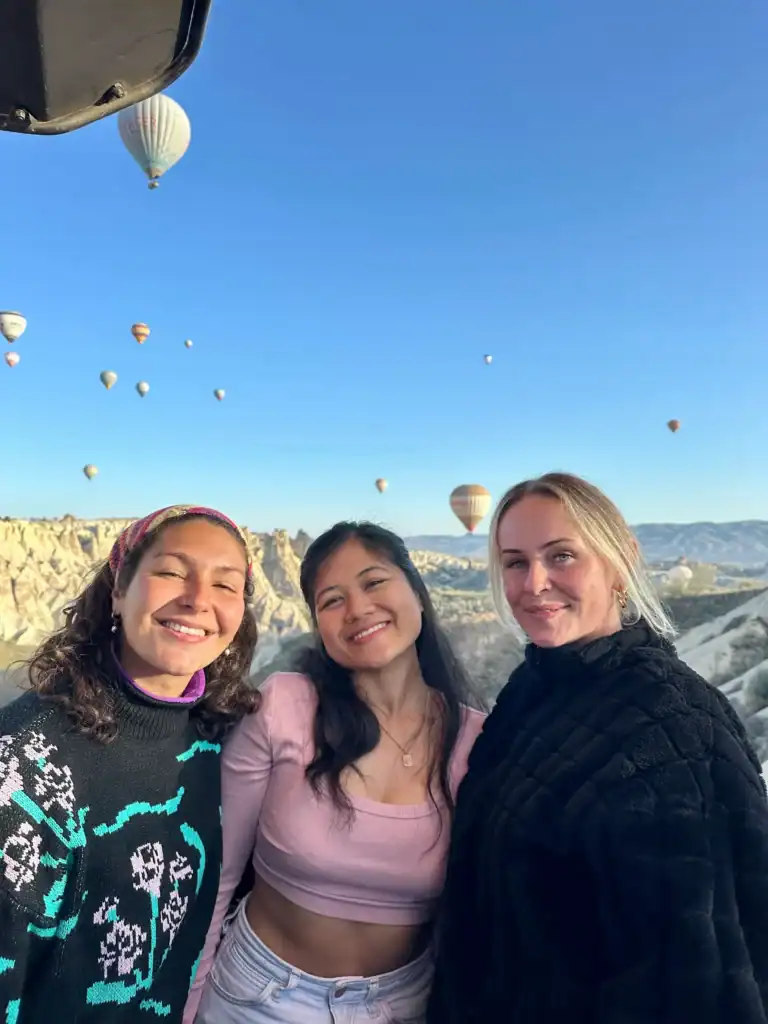
5. Clear Expectations = Safer Experiences
If there’s one thing I’ve learned from volunteering, it’s this: most bad experiences aren’t about unsafe places—they’re about unclear expectations.
I once volunteered at a homestay in Athens. Before arriving, we agreed I’d help with social media, do some language exchange with the host’s daughter, and pitch in with cleaning. But the day before I got there, the host discovered an infestation in her home. Understandably, the focus shifted—suddenly, we were doing way more housework, and the schedule changed every day.
She was kind and apologetic, and once we talked things through, we restructured the exchange to make room for what I also wanted to do in Athens. Even good hosts can have unexpected changes—and you need to communicate clearly to make it work for both of you.
Set Expectations Before You Arrive
I ask most of my questions upfront—either during the application or on a call. Before confirming the trip, I always send a quick message summarizing what we agreed upon directly on the Worldpackers app. And if something comes up, even if I already confirmed, I still clarify things. This way, everything’s in writing, and I know what I’m walking into.
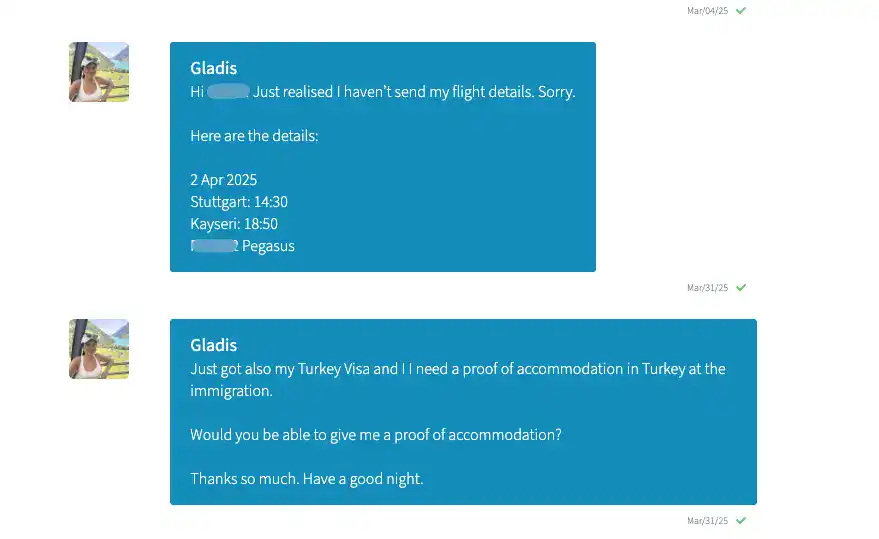
Here’s the checklist I personally use (and recommend!):
16 Questions to Ask Your Host Before Confirming
Take the time to read the host’s listing closely—then ask about anything that isn’t already covered. It shows you read what they wrote and saves everyone time.
- What are the daily tasks?
- How many hours per day will you be working?
- What days will you have off?
- Where will you sleep? (Private room, shared dorm, couch?)
- Is food provided? If yes, how many meals per day?
- Is there a shared kitchen you can use?
- Are other volunteers staying with you at the same time?
- Is there public transportation nearby?
- Is there a bike you can borrow?
- What’s the Wi-Fi situation? (Especially important if you’re working remotely)
- Do they follow a set schedule, or is it flexible?
- Do they offer any tours or discounts on tours, restaurants, or pubs?
- Will they pick you up on the day of arrival—or recommend how to get there?
- Will you need any specific clothes for the work, weather, or local culture?
- You can also mention a “must-do” in the area and ask how they recommend doing it.
- If there’s something you want to learn during the experience, ask if they can help or teach you.
You don’t need to sound demanding or formal—just curious and clear. A good host will appreciate that you’re being intentional. And if they get annoyed or vague in their replies? That’s already a red flag.
6. Volunteering Isn’t Just Safe—It’s Transformative
Yes, volunteering saves you money. Yes, it helps you travel longer. But what no one tells you—until you experience it yourself—is how deeply it changes you.
I’ll never forget this one moment in Alaska. I was volunteering at a small inn, and one of the perks was a heavily discounted glacier dinner cruise—$20 for something that normally costs $200. We boarded the boat with other volunteers I’d just met days earlier. As we drifted past icebergs and cliffs, we spotted puffins, bald eagles, and humpback whales. For the first time in my life, I was seeing these animals in the wild.
At some point, I turned to a co-volunteer and we both laughed, “This is why we clean toilets.” It became our running joke for the rest of the trip. Every time we saw a jaw-dropping view, we’d smile and say, “This is why we volunteer.”
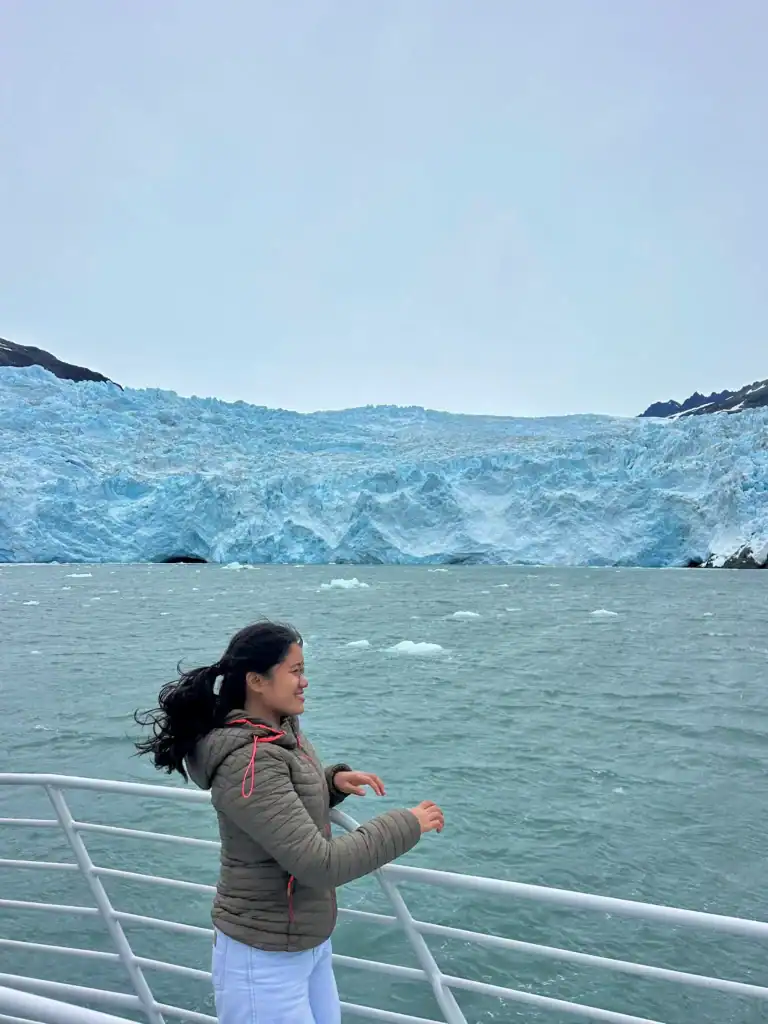
That cruise wasn’t just beautiful—it was humbling. We met a retired couple onboard who told us, “You’re doing it right. We can finally afford this trip, but we can no longer hike. Do this while you’re young.”
More Than Travel—It’s Presence
Volunteering has allowed me to travel full-time after I quit my job. But it’s been more than just a way to “see the world.”
It’s helped me feel it.
It taught me how to slow down. To stay in a place not because I could afford the room, but because I offered something of value. It pushed me out of my comfort zone—to rely on myself, to accept help from strangers, to trust that the world isn’t as scary as we’re taught to believe.
It opened my heart to cultures I never imagined I’d understand. It made me grateful for both the simple comforts I have at home and the unexpected ones I find on the road. Volunteering helped me be more alive, more present, more human.
I’ve written more about this shift in perspective, why traveling makes you happy, and how it goes far beyond postcards and plane tickets.
It’s Not Tourism—It’s Something Deeper
Volunteering is very different from being a tourist.
You stay longer, you move slower. You’re not rushing to cram a dozen things into a weekend. Instead, you have time to visit that famous site when the weather’s nice—or on a weekday when the crowds are gone. You get tips from your host about where to eat, where to avoid, and what’s actually worth doing.
You don’t just take photos of a culture—you live alongside it.
That said, it’s not all perfect. I’ve had days where I worked a morning shift and was too tired to hike in the afternoon. Or wanted to explore a nearby town but had to be back for an evening task. Sometimes, it’s a trade-off.
But for me, the benefits always outweigh these small sacrifices.
If You’re Curious, Try It
If you’ve made it this far and something inside you is still curious—try it. And if you’re wondering where to begin, here are 27 slow travel destinations that changed me—they might just change you, too.
Volunteering isn’t for everyone. But if it’s for you, it might be one of the most life-changing decisions you’ll ever make.
And yes, that sounds cliché. But so is watching whales at sunset and thinking, “This is why I’m here.”
Ready to Start Your First Volunteer Adventure?
If you’ve ever dreamed of traveling the world with more meaning, connection, and freedom—this is your sign to start.
Volunteering lets you slow down, meet incredible people, and experience life more deeply—without needing a big budget or a perfect plan.
Join Worldpackers and get $10 off your membership using my discount link. Then check out my full Worldpackers review after one year of volunteering for a look at my real experiences across three continents.
You don’t need to have it all figured out.
You just need to begin.



